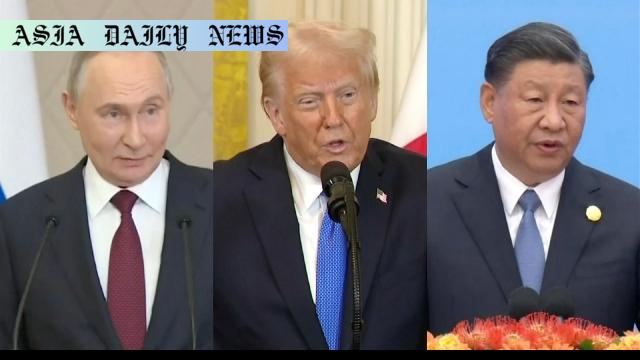Denuclearization: Trump seeks talks with China and Russia to cut nuclear weapons and proposes reducing military budgets by half.
Denuclearization: Trump seeks talks with China and Russia to reduce nuclear arms and prioritize global security.
The US President underlines the importance of reducing military budgets and existing nuclear weapon stockpiles.
Trump expresses optimism, citing good relationships with both Xi and Putin for fostering potential agreements.

Trump’s Vision for Denuclearization
US President Donald Trump recently announced his interest in spearheading denuclearization discussions with China and Russia, specifically with their respective leaders, Xi Jinping and Vladimir Putin. Trump’s initiative aims to foster a global reduction in nuclear arms, addressing longstanding concerns about the staggering number of weapons capable of catastrophic destruction.
A Push for Diplomatic Engagement with Key Leaders
The US President emphasized his belief in collaborative leadership, citing previous dialogues with Russian President Putin on disarmament as foundational to strengthening these efforts. Trump mentioned his solid rapport with both Xi and Putin, expressing confidence in the possibility of productive negotiations with their administrations. His proposal entails starting with bilateral discussions with each leader before pursuing a coordinated trilateral agreement.
The Dire Need for Nuclear Reduction
Trump’s comments come amidst global concerns surrounding nuclear proliferation and the exponential costs tied to maintaining and expanding these weapon systems. He highlighted the alarming excess of nuclear capabilities, noting that humanity has stockpiled enough arms to obliterate the planet dozens of times over. This situation, Trump argues, underscores the futility and urgency of current policies and agreements limiting armament levels.
Expanding the Scope to Military Budgets
Beyond reducing nuclear weapons, President Trump broached a bold idea: slashing military budgets for all involved parties by half. This proposal, while ambitious, aligns with his broader efforts toward resource optimization and peaceful conflict resolution. Reductions in defense spending could enable redirection of funds towards domestic improvements and humanitarian assistance worldwide.
Challenges to Global Denuclearization
While Trump’s approach is ambitious, it does not come without challenges. Current geopolitical tensions and competitive dynamics among the US, China, and Russia present potential barriers. Additionally, achieving consensus on the scope and timeline of disarmament and military cuts will likely involve extensive negotiations and mutual concessions.
Looking Ahead
Despite these hurdles, Trump’s announcement highlights a significant pivot toward prioritizing arms control. If successful, these talks could catalyze global efforts to reduce nuclear threats while fostering better diplomatic relationships between the world’s leading nations. For now, expectations are high, with the world awaiting further developments and clarity on the timeline for these crucial talks.
Commentary
The Promise and Potential of Denuclearization Talks
President Trump’s call for denuclearization talks signifies a bold strategic shift in addressing one of humanity’s most challenging threats. By emphasizing collaboration with two of the world’s other major powers—China and Russia—Trump has highlighted the critical need for unified global action on arms reduction. His vision of reducing not only nuclear stockpiles but military budgets in general reflects an ambitious, albeit challenging, pathway to global stability.
Challenges Ahead and the Role of Leadership
However, the path to achieving this vision will undoubtedly be fraught with challenges. Geopolitical rivalries and mutual distrust between these nations may stall progress or lead to superficial agreements lacking substantive changes. Leadership will play a decisive role here, as establishing trust and fostering transparent communication will be pivotal to overcoming entrenched differences. Trump’s claim of positive relationships with Xi and Putin is encouraging, but the success of these dialogues will also depend on sustained follow-through and strategic compromise.
The Need for Pragmatic Realism and Optimism
While optimism is necessary, realism must also guide expectations. Denuclearization processes are notoriously lengthy, requiring extensive verification measures and cross-border cooperation. Still, one cannot underestimate the symbolic and pragmatic importance of initiating these conversations. Regardless of immediate action, these efforts could recalibrate global discourse on arms control and security, setting an example for other nations to follow.
A Global Responsibility
The broader message here is clear: the reduction of nuclear arms and military spending is not only an American, Chinese, or Russian concern—it is a global responsibility. Collaboration on a goal of this magnitude could pave the way for significant humanitarian benefits, redirecting critical resources toward pressing issues like climate change, poverty alleviation, and global public health.


